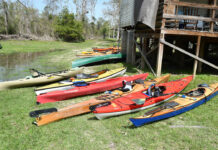Dr. John Fogarty has served as Dean of the FSU College of Medicine since August, 2008. Prior to that, he was Senior Associate Dean for Operations and Associate Dean for Primary Care at the University of Vermont College of Medicine. Dr. Fogarty is Board Certified in Family Medicine and is a Fellow of the American Academy of Family Physicians.
He began at Rotary, “I really appreciate the invitation to come and just to tell you a little bit about where the College of Medicine is and to thank you for all the things that this community has done to help us establish this College of Medicine and do some very, very unique things.”
“It may be hard for some people to believe but we are actually 16 years old already. We were the first new medical school in about 20 years in this country, when we were conceived by the legislature back in 2000. We have now graduated 12 classes from the Medical School, our first class was in 2005 and we graduated 27 students and now we are graduating 120 per year at full enrollment. We have now graduated over a thousand graduates. We are very proud of what our students are doing in terms of 55 percent are in primary care, and many, many of our students who have trained out of state our now coming back and are working in Florida. Only 13 percent of our students are actually practicing in rural areas, so keep that in mind.”
“I’m going to give you a little bit of history of the College of Medicine. As I said, we were founded in 2000 by the legislature, and this is a story I tell all the time. In the 1999-2000-time frame, there were actually some studies that suggested that we had too many doctors in this country. We really didn’t need any new medical schools. The last generation of medical schools was actually in the 70s and 80s. We did our own analysis at that time and we said even if you believe we have too many doctors you can’t possibly believe they were in the right places. The places we were training doctors in the academic medical centers, they just go there and they stay there, and they never go home again. So, we thought the only way for us to develop and produce the kind of doctors Florida needs was actually to train them in a very different model. We started out from the very beginning with a very focused mission of this Medical School to train doctors for rural and underserved areas.”
“We are very proud of the fact that out of the 15 or 16 classes that we have recruited so far, 25 percent are from Lake City and west. Now if you look at the demographics of that area, 25 percent of our students are coming from an area of Florida that makes up about eight percent of the total population.”
“What we have found in this community, which is also exciting for me, is that having a regional campus here, a rural track here I think that has really helped Jackson to be able to hire the doctors to be your faculty. You are trying to recruit a doctor to a rural area, and that’s sometimes challenging. We tell them that we would like them to be a part of this teaching program, that we have a teaching program at the College of Medicine.”
“I know that the medical staff at Jackson and all of the community physicians just love working with our students and love the opportunities to bring them into their offices, share their patients with them, and do very, very well.”
“Anthony Speights and Dr. Steve Spence, they really are responsible for the care and feeding of these students and making sure they are getting a one of a kind experience. They are demonstrating that our students are seeing lots of patients and are seeing many more patients that they are required to see in terms of the expectations of each one of our curriculum objectives, and things to do well on for their boards and standardized tests.”
“Twenty-four College of Medicine graduates grew up in Jackson and surrounding counties. We are getting a lot of your students and we hope they are having a great experience at the main campus and when they come out here that they come back here.”
“We were recently informed last year that the College of Medicine is the second most competitive medical school in the country right now. It’s due to the number of applications that particular year that the data came out we had over 6,400 applications. We only do about 350 interviews to indentify who we want for our classes. Out of that 350 that year that the data came out we only had to make 158 offers to fill a class of 120. What I’m describing is that the Florida State University College of Medicine is becoming a school of choice. We are the fourth highest in African-American enrollment.”
“Many of the programs we have started have really bore fruit for us in terms of bringing the kind of students to Florida State that we are really looking for. A majority of our class are Florida State undergrads. That’s impressive in the last 10 years, because when I got to Florida State we had many, many more students from the University of Florida than we did FSU. It has nothing to do with football; they just have good students over there.”
“The latest and greatest thing we are doing is developing a Physician’s Assistant program, basically it’s a Masters level program and we have had it approved up to the Board of Trustees. We are hoping to get full accreditation in March and start class in August with 40 students. We plan on increasing that rapidly over the years from 40 to 50 to 60.”
“My belief of the future of medical care is a team based care in an office setting P. A.’s, Nurse Practioners, and doctors working together to take care of patients in that ambulatory setting. Team based care in my opinion is the future.”
Rotary thanked Dr. Fogarty for his informative talk.




